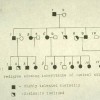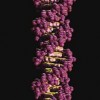Posts tagged Inheritance

How can I prolong health? Hmmm…..
Nov 6th
Having an edge on the stock market can allow one to make hundreds, thousands or even millions of dollars. But rarely do we think of having an edge on life. Since the sequencing of the human genome our understanding of human genes and their interaction has grown. Geneticists now have the capability to analyze genetic make-ups, and elucidate what genetic patterns will evolve into certain conditions or disease states.
Any individual has a unique genetic profile different from that of another person. Contained within these differences are unique genetic variations that may make a person more susceptible to diseases such as More >

Trembling Hands and … Genes?
Oct 23rd
Fragile X Tremor/Ataxia Syndrome (FXTAS) is among the most prevalent heritable neurodegenerative disorders. Its symptoms usually develop in men 50 years of age or older and include tremors in arms and hands, balance problems (ataxia), numbness in the extremities, mood instability, short-term memory loss, and gradual intellectual decline. The prevalence of FXTAS is about 2-5 persons per 10,000 in the general population.
The underlying cause for FXTAS is a mutation in the gene for Fragile X Mental Retardation Protein (FMRP), which is located on the X-chromosome; its protein product, Pur-α is essential for normal neural function. Scientists have recently determined the three-dimensional structure More >

Medicine or Poison? It’s in Your Genes, duh…
Sep 24th
As the ongoing deciphering of the human genome provides us with more and more insights about our predisposition for diseases and genetic disorders, (see Your Genes Your Health for examples) I am equally, if not more astounded by what it tells us about our ability to utilize medicines to counteract diseases.
Just recently, a group of researchers at the University of Maryland School of Medicine have identified a variant of a gene that is believed to play a major role in determining why people do not respond to a popular anti-clotting medication. This gene variant, carried by as many as a third More >

It’s All Your Parents’ Fault
Sep 15th
Eugenicists looked at a diversity of “traits” and asserted that many of them were genetically inherited, excluding any other cause. The subjects of the studies often came from unique populations, including circus performers, residents in mental institutions, and even historical figures, long deceased.
A quick search in the Eugenics Archive reveals some of the traits studied by Eugenicists:
Civic leadership Musical ability Dressmaking Epilepsy Dwarfism Giantism Carpentry Deafness Eye color Insanity Longevity Shiftlessness Cancer Blindness Albinism Hemophilia Boat building Degeneracy Poverty Feeblemindedness Cleft palate Hare lip Manic depression Hair color, texture Polydactyly Height Literary ability Inventiveness Color blindness Mechanical skill Artistic ability More >

A Complication Of Sickle Cell
Sep 12th
This blog serves to provide information about a common complication of sickle cell disease known as pulminary hypertension. Puluminary hypertension is a disorder in which one has elevated pulminary artery pressure and pulminary vascular resistance. Pulminary hypertension turns out to be a rising risk factor for morbidity and mortality in adults with sickle cell disease. As in other chronic haemolytic disorders an echocardiograph is very helpful in elucidating pulminary hypertension. Any insight into the disposition of the patient can decrease the progression of the disease early on. Therapy for these patients may consist of vasodilators and or antiremodiling agents depending More >

Passing on Genes and Traits
Sep 9th
Why do you look the way you do? There are many ways to answer this question, but essentially it all comes down to the information in your DNA and the proteins your cells make. Your DNA contains genes that code for proteins. Different proteins have different functions, each contributing to your various traits and functions.
Why do we often see similar traits among parents and offspring? We inherit our DNA from our mother and father. This means we have half of our genes, or recipes, from our mom and half from our dad. Even with this basic idea, it can be More >

Teaching Genetics: Simplicity for Success
Sep 2nd
I love to talk about the biology behind how life works with other people. Some of the best conversations I have ever had have been with fifth graders learning about DNA. I am amazed that they know an incredible amount of information relating to genetics, way more than I ever knew when I was their age.
I currently teach genetics and molecular biology to middle school students, high school students, teachers, and the general public. One of the greatest skills I have learned in my current position is the importance of engaging your audience and making the material you are introducing More >

Do Genes Always Follow the Rules?
Aug 31st
As a teacher, I find that the presentation of classical Mendelian inheritance is important, but can be misleading. Do genes always follow the rules that the “Father of Genetics” observed in his garden? Don’t get me wrong, I appreciate Mendel and his contribution to genetics, but the exceptions seem much more interesting!
For example, many genes are pleiotropic, meaning they affect more than one phenotype. How about the recent development on red heads and anasthetics? I happen to live with a red head, from a long line of red heads, so in our family this was a topic of discussion for days. The mutation More >
